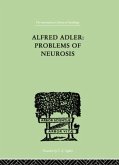When we hear such expressions as feelings of inferiority and insecurity, striving for self-enhancement and power, woman's revolt against her feminine role, the oversolicitous mother, the dethronement of the first-born, the need for affection; when maladjustment is spoken of as self-centeredness, psychological health as other-centeredness; psychiatry as the science of interpersonal relations, neurotic symptoms as ego-defenses and forms of aggression, to mention only a few instances?we are meeting ideas in which Alfred Adler was the pioneer from 1907, the date of his first important publication, until his death in 1937. The purpose of the present volume is to make Adler's contributions to the theory and practice of psychology available in a systematic and at the same time authentic form. To this end we made selections from his writ- ings and organized them with the aim of approximating the general presentation of a college textbook. Because every word in the main body of the work is Adler's, the outcome of our efforts, if we have been successful, should be the equivalent of a textbook by Adler on Individual Psychology, the name which he gave to his system.
Hinweis: Dieser Artikel kann nur an eine deutsche Lieferadresse ausgeliefert werden.
Hinweis: Dieser Artikel kann nur an eine deutsche Lieferadresse ausgeliefert werden.








